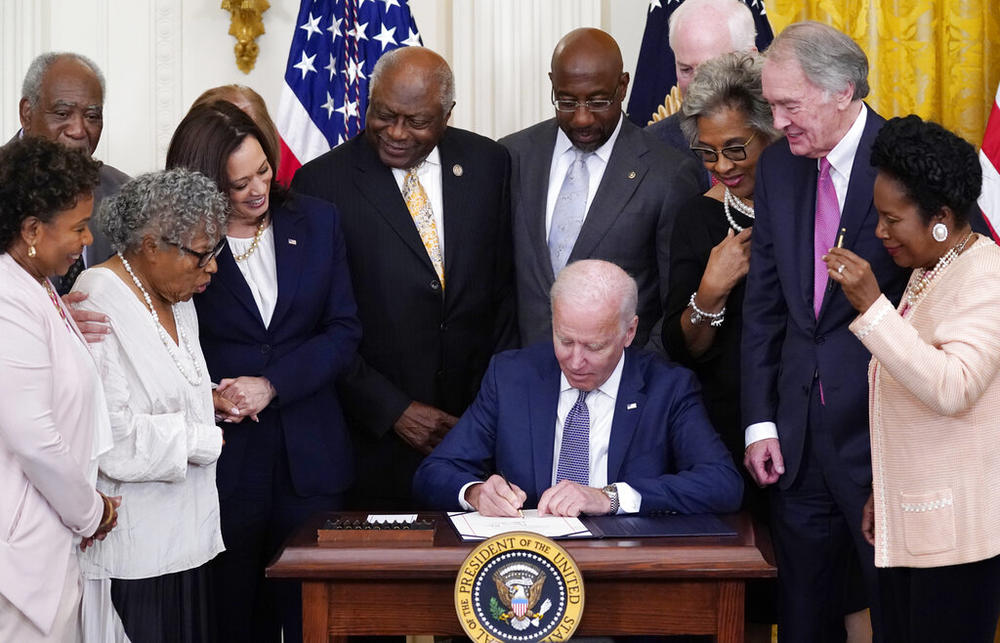
Caption
President Joe Biden signs the Juneteenth National Independence Day Act, in the East Room of the White House, Thursday, June 17, 2021, in Washington.
Credit: (AP Photo/Evan Vucci)
|Updated: June 17, 2021 5:26 PM

President Joe Biden signs the Juneteenth National Independence Day Act, in the East Room of the White House, Thursday, June 17, 2021, in Washington.
President Joe Biden signed a bill into law Thursday afternoon that establishes Juneteenth, the date that marked the end of slavery, as a federal holiday.
It is the first date to be dedicated as a national holiday since Martin Luther King, Jr. Day, nearly four decades ago.
Juneteenth commemorates the day in 1865 when Union soldiers arrived in Galveston, Texas, to announce the abolition of slavery and end of the Civil War. The June 19 date will now be recognized on the federal calendar 156 years later.
During his remarks, Biden recognized the new holiday as both a celebration of history and a time to reflect on a dark chapter in the country’s past.
“This is a day of profound weight and profound power,” he said. “Today, I want you to remember the moral stain, the terrible toll, that slavery took on the country and continues to take — what I've long called America's original sin."
The president signed the legislation in the East Room of the White House, 158 years after President Abraham Lincoln signed the Emancipation Proclamation in the same place.
Watching from the front row was Opal Lee, a 94-year-old activist from Texas who led the push for Juneteenth to become a federal holiday.
Vice President Kamala Harris, the nation’s first female, Black and South Asian American ever to hold the second highest political office, noted that while establishing a new holiday, the country is also making an important statement to acknowledge its history.
“It is not only a day of pride,” she said. “It is also a day for us to reaffirm and rededicate ourselves to action.”
Multiple members of Georgia’s congressional delegation attended the bill signing, including U.S. Reps. Nikema Williams, Rep. Hank Johnson and both of Georgia’s recently elected senators.
U.S. Sen. Rev. Raphael Warnock, senior pastor of Ebenezer Baptist Church, the spiritual home of Martin Luther King Jr., flanked the president as he signed the bill into law.
The U.S. House passed the bill Wednesday with overwhelming bipartisan support, one day after the Senate passed the legislation by unanimous consent. The president touted the bill as an example to the nation that Democrats and Republicans can reach across the aisle, at a time when it’s hard to imagine.
“Great nations don't ignore their most painful moments," Biden said. “They don't ignore those moments in the past — they embrace them. Great nations don't walk away. We come to terms with mistakes we’ve made and, in remembering those moments, we begin to heal and grow stronger.”
Many states recognize Juneteenth as a state holiday or commemorate the date, but the bill will establish the day as nationally recognized. In 2011, Georgia became the 37th state to recognize Juneteenth.
Georgia U.S. Rep. David Scott took to the well during debate ahead of the chamber’s vote and addressed his Republican colleagues directly about the impact of their vote.
“All we’re asking is for you to express the feeling and the depth of the African American people today, who need you, all of us, white and Black members of Congress, to stand together and vote 'Yes,'” he said. “And by doing so, you will say not, 'This is my country,' you will say, in one united voice, 'This is our country — Black and white.'”
The bill passed the chamber in a 415-14 vote.
Every Georgia House member voted in favor of the bill except for Athens Republican U.S. Rep. Andrew Clyde, who recently made headlines for controversial remarks comparing the Jan. 6 insurrection to “a normal tourist visit.”
The celebration and new holiday recognition of June 19 comes amid a controversial conservative movement to ban school discussions about systemic racism, historic inequities and the effects of slavery that still linger today, dubbed critical race theory.
Georgia is among the states leading an effort to ban the topic from classrooms. The state’s governor-appointed Board of Education passed a resolution earlier this month that aims to keep conversations about historic inequities out of curriculums.
Gov. Brian Kemp, who has recently launched a string of conservative efforts to win back far-right voters ahead of the 2022 election, called critical race theory a “dangerous, anti-American ideology” and praised the state board’s vote.
Both Biden and Harris alluded during their remarks to efforts to scrub American’s past and warned against ignoring history.
“We must learn from our history and we must teach our children our history,” Harris said. “Because it is a part of our history as a nation, it is part of American history.”
Dr. Andra Gillespie, professor of political science at Emory University, pointed to the fact that while the Juneteenth bill is a successful symbolic gesture, there are other substantive pieces of legislation born from last summer’s national calls for racial justice that have not garnered bipartisan support.
“I think it’s important to point out that Juneteenth is getting passed with relative ease, whereas other substantive things that came out of last summer, like the George Floyd Policing Act, still have a very, very long way to go,” she said on GPB's Political Rewind. “This is the low-hanging fruit. There are still other things that need to be done even though this is a very powerful and symbolic moment.”
Biden acknowledged that the country has much to do to break racial inequities that permeate deeply through government systems.
“By making Juneteenth a federal holiday, all Americans feel the power of this day and learn from our history,” he said. “Celebrate the progress and grapple with the distance we've come, with the distance we have to travel, too.”